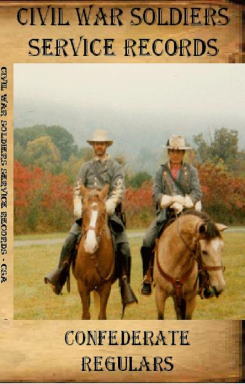Four Years in the Saddleby Col. Harry Gilmor Virginia 12th Cavalry Regiment |
|

Harry Gilmor was born January 24, 1838 at "Glen Ellen", the family estate in Baltimore County, Maryland. After homesteading in Wisconsin and Nebraska, he returned to Maryland in time to join the newly formed Baltimore County Horse Guards as a corporal.
After the efforts of the citizens of Baltimore to prevent the movement of Federal troops through the city, the Horse Guards received orders to burn several bridges north of the city to prevent further troop movements toward Washington City.
Gilmor was one of many to be arrested and imprisoned in Fort McHenry following the occupation of Baltimore by Federal troops under Brigadier General Benjamin "Beast" Butler. After his release, he traveled South and joined the command of Colonel Turner Ashby on August 31, 1861.
In March 1862, he was commissioned Captain of Company F, Twelfth Virginia Cavalry. Captain Gilmor served throughout the Valley Campaign. At times, he was on special assignment to General Thomas J. "Stonewall" Jackson.
This book is presented in the form of a diary. It was written while he was imprisoned and reflects his excellent education and command of language.
Harry Gilmor lived in New Orleans for several years after the war where he married Miss Mentoria Strong. Upon his return to Maryland, he was elected colonel of cavalry in the Maryland National Guard. He also served as Baltimore City Police Commissioner from 1874 to 1879. He was a member of the Society of the Army and Navy of the Confederate States in Maryland and it's Vice-President in 1882.
Harry Gilmor died in Baltimore on March 4, 1883 at the age of forty-five. He was interred on "Confederate Hill" in Loudon Park Cemetery. To this day, people gather at his graveside on the anniversary of his birth to honor his life long service to his country.
From the book - a description of an encounter with Gen. Stonewall Jackson.
Tbe place was an open bottom, well up to the front, for every shot could be heard distinctly, and occasionally a stray bullet would come whizzing by, Mr. Dabney stood on the ground uncovered; General Jackson a few paces in front, resting on one foot, with his hat off, shading his face from the sun. I watched him closely, and saw not a muscle change during the whole service. The sturdy soldiers, trained in many a hard-fought field, were lying around on bunches of hay, taken from the stacks nearby; and although an incessant skirmish fire was going on, all listened attentively, with every eye fastened upon the great chief. Few have I ever seen with such unflinching nerve, and it was his iron will that won for him many a stubborn fight.
While sitting near him the day previous, with my company assigned to the rear to act as couriers, a shell came crashing through the trees, and cut asunder a large white oak within a few feet of the general. It fell,but fortunately it fell away from him, otherrwise he must have been crushed to death.
"My gracious! general," I exclaimed, You have made a narrow escape."
He was then a little hard of hearing ; and thinking he he had not heard me, I repeated,
"You have had a narrow escape, sir."
"Ah! you think so, sir� you think so."
And, turning toward my men, "You had better shelter them in a ravine nearby," but did not move himself until he was called to another part of the field. Fear had no lodgment in that man's breast.
291 pgs.
Paperback - $25.00
CD-ROM - $15.00
EBOOK - $9.49

A Copy of this book is available in the
ResearchOnLine ![]() Digital Library.
Digital Library.
 Four Years in the Saddle
Four Years in the SaddleCol. Harry Gilmor
291 pgs.
HARDBACK - $45.00
PAPERBACK - $25.00
DVD - $15.00
EBOOK - $15.00
Hardback, Paperback, DVD or Ebook
| Ordering via EMAIL is easy. Click Here |
Orders may also be sent via U.S. Snail to:
Eastern Digital Resources
6219 Hillandale Rd.
Davenport, IA 52806









